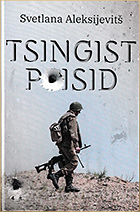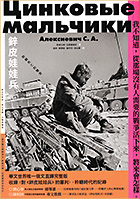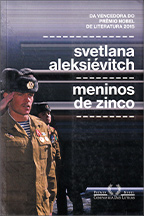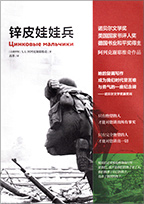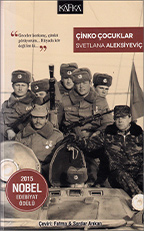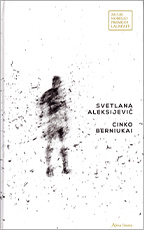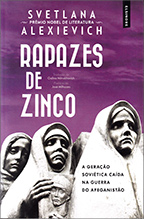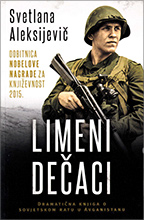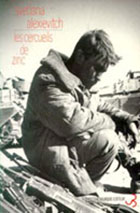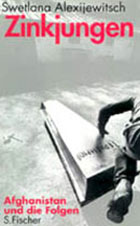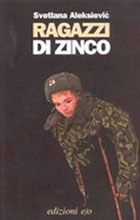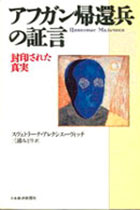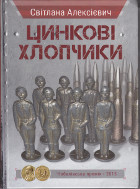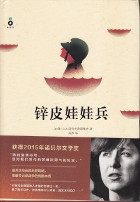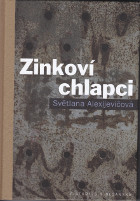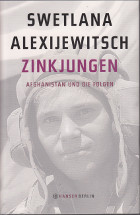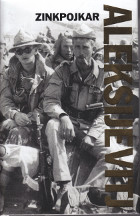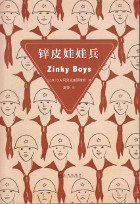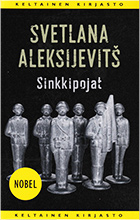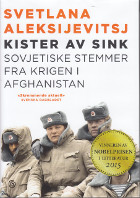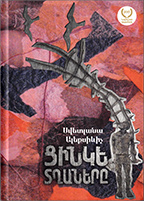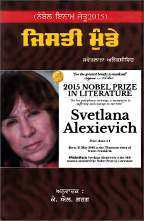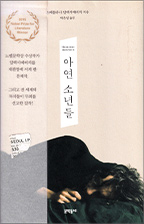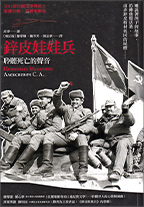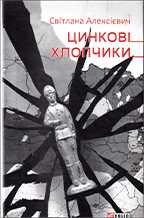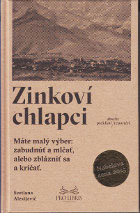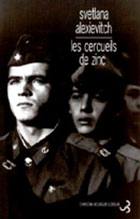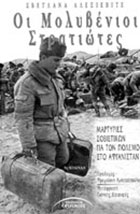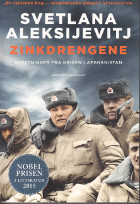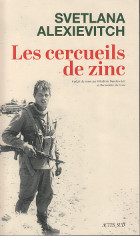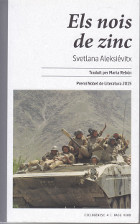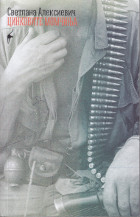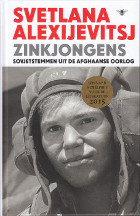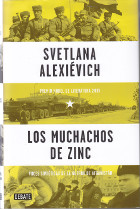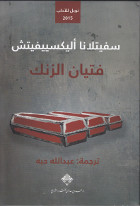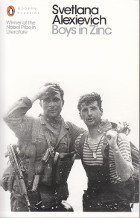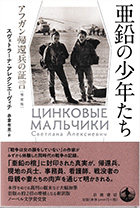Svetlana Alexievich. Boys in Zinc
Proposal
Published by
- Vremya, Russia
- W.W. Norton, USA
- Hanser Berlin, Germany
- Ersatz, Sweden
- Czarne, Poland
- edizioni e/o, Italy
- Citic, China
- Kagge, Norway
- Penguin Random House, Spain
- Mamdouh Adwan Publishing, Syria
- Munhakdongne, South Korea
- Absynt, Slovakia
- Rayo Verde Editorial, Spain (Catalan)
- Fan Noli, Albania
- Palomar, Denmark
- Laguna, Serbia (rights have been reverted)
- De Bezige Bij, The Netherlands
- 20|20 Editora, Portugal
- Grup Media Litera, Romania
- Penguin Classics, UK
- Pistorius & Olsanska, Czech Republic
- Bukinist, Armenia
- Owl Publishing House, Taiwan
- Nebesht Press, Iran
- Navyug Publishers, India (Punjabi)
- Alma littera, Lithuania
- Artanuji Publishers, Georgia
- Woman Publishing House, Vietnam
- Európa Publishers, Hungary
- Begemot, North Macedonia (rights have been reverted)
- Actes Sud, France
- Folio, Ukraine
- Epsilon, Turkey
- Edicije Bozicevic, Croatia
- Iwanami Shoten, Japan
- Tammi, Finland
- Owl, Taiwan
- Nebesht Press, Iran
Published in 1991, this book hit like the explosion of a bomb. Alexievich was sued for libel and for “besmirching the honor of soldiers.” The book’s title comes from the thousands of soldiers who died during the Russian incursion into Afghanistan between 1979 and 1985 and were returned to Russia in zinc coffins. Alexievich weaves together the stories told by more than a hundred officers, enlisted men, wives, mothers and widows into an artfully elaborate collage. The tales that they tell about people who were mutilated by mines, about drugged murderous soldiers, about a mother desperately caressing a coffin so small that she cannot believe that it could contain her tall son, give Alexievich the opportunity to ask the question: “Who are we? How could all this be done to us and by us? Why did we believe it all?” This book is not only about war and criminal politics, but also about the clash of two entirely antithetical civilisations and the sheer senselessness and vanity of the idea of ever winning – whatever the superiority in arms technology – final victory over a demonized opponent.
***
Excerpt from the Nobel Lecture 2015:
I’m in Kabul. I don’t want to write about war anymore. But here I am in a real war. The newspaper Pravda says: “We are helping the fraternal Afghan people build socialism.” People of war and objects of war are everywhere. Wartime.
They wouldn’t take me into battle yesterday: “Stay in the hotel, young lady. We’ll have to answer for you later.” I’m sitting in the hotel, thinking: there is something immoral in scrutinizing other people’s courage and the risks they take. I’ve been here for two weeks and I can’t shake the feeling that war is a product of masculine nature, which is unfathomable to me. But the everyday accessories of war are grand. I discovered for myself that weapons are beautiful: machine guns, mines, tanks. Man has put a lot of thought into how best to kill other men. The eternal dispute between truth and beauty. They showed me a new Italian mine, and my “feminine” reaction was: “It’s beautiful. Why is it beautiful?” They explained to me precisely, in military terms: if someone drives over or steps on this mine just so… at a certain angle… there would be nothing left but half a bucket of flesh. People talk about abnormal things here as though they’re normal, taken for granted. Well, you know, it’s war…. No one is driven insane by these pictures—for instance, there’s a man lying on the ground who was killed not by the elements, not by fate, but by another man.
I watched the loading of a “black tulip” (the airplane that carries casualties back home in zinc coffins). The dead are often dressed in old military uniforms from the ‘40s, with jodhpurs; sometimes there aren’t even enough of those to go around. The soldiers were chatting: “They just delivered some new ones to the fridges. It smells like boar gone bad.” I am going to write about this. I’m afraid that no one at home will believe me. Our newspapers just write about friendship alleys planted by Soviet soldiers.
I talk to the guys. Many have come voluntarily. They asked to come here. I note that most are from educated families, the intelligentsia—teachers, doctors, librarians—in a word, bookish people. They sincerely dreamed of helping the Afghan people build socialism. Now they laugh at themselves. I was shown a place at the airport where hundreds of zinc coffins sparkle mysteriously in the sun. The officer accompanying me couldn’t help himself: “Who knows…my coffin might be over there… They’ll stick me in it… What am I fighting for here?” His own words scared him and he immediately said: “Don’t write that down.”
At night I dream of the dead, they all have looks of surprise on their faces: what, you mean I was killed? Have I really been killed?”
I drove to a hospital for Afghan civilians with a group of nurses—we brought presents for the children. Toys, candy, cookies. I had about five teddy bears. We arrived at the hospital, a long barracks. No one has more than a blanket for bedding. A young Afghan woman approached me, holding a child in her arms. She wanted to say something—over the last ten years almost everyone here has learned to speak a little Russian— and I handed the child a toy, which he took with his teeth. “Why his teeth?” I asked in surprise. She pulled the blanket off his tiny body—the little boy was missing both arms. “It was when your Russians bombed.” Someone held me up as I began to fall.
I saw our “Grad” rockets turn villages into plowed fields. I visited an Afghan cemetery, which was about the length of one of their villages. Somewhere in the middle of the cemetery an old Afghan woman was shouting. I remembered the howl of a mother in a village near Minsk when they carried a zinc coffin into the house. The cry wasn’t human or animal… It resembled what I heard at the Kabul cemetery…
I have to admit that I didn’t become free all at once. I was sincere with my subjects, and they trusted me. Each of us has his or her own path to freedom. Before Afghanistan, I believed in socialism with a human face. I came back from Afghanistan free of all illusions. “Forgive me father,” I said when I saw him. “You raised me to believe in communist ideals, but seeing those young men, recent Soviet schoolboys like the ones you and Mama taught (my parents were village school teachers), kill people they don’t know, on foreign territory, was enough to turn all your words to ash. We are murderers, Papa, do you understand!?” My father cried.
Many people returned free from Afghanistan. But there are other examples, too. There was a young fellow in Afghanistan who shouted to me: “You’re a woman, what do you understand about war? You think that people die a pretty death in war, like they do in books and movies? Yesterday my friend was killed, he took a bullet in the head, and kept running another ten meters, trying to catch his own brains…” Seven years later, the same fellow is a successful businessman, who likes to tell stories about Afghanistan. He called me: “What are your books for? They’re too scary.” He was a different person, no longer the young man I’d met amid death, who didn’t want to die at age twenty…
I ask myself what kind of book I want to write about war. I’d like to write a book about a person who doesn’t shoot, who can’t fire on another human being, who suffers at the very idea of war. Where is he? I haven’t met him.
